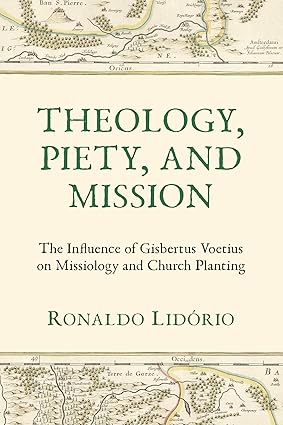
Ronaldo Lidorio
Reviewed by: Charles R. Biggs
Theology, Piety, and Mission: The Influence of Gisbertus Voetius on Missiology and Church Planting, by Ronaldo Lidorio. Reformation Heritage, 2023. Paperback, 144 pages, $16.00. Reviewed by OP minister Charles R. Biggs.
Missionary forefather and faithful church planter Gisbertus Voetius (1589–1676) argued that the crux of missions is not the lost, but God and his glory. Voetius challenges all church planters to consider that the greatest missionary challenge is not church planting, but love (54). True love is learned and expressed in our seeking to glorify God and enjoy him forever. As recipients of his love in Christ, we are empowered by the Holy Spirit as those “called and sent” to collaborate with our triune God in his loving mission of seeking and saving the lost.
Voetius has sometimes been called the “John Owen” of the Dutch Further Reformation. His commitment to godliness, scholarship, his love for the church, and his voluminous writings testify to this. Many lovers of the history of the Reformation may remember that Voetius was an influential participant of the Synod of Dort (1618–1619).
As a follower of John Calvin, Voetius emphasized the biblical teaching of the sovereignty of God in redemption. In his pursuit to wed theological truth to piety, or a godly life, he also desired missiology to be thoroughly God-centered and Trinitarian. Explaining Voetius’s view, Lidorio writes, “If we see mission as theocentric and Trinitarian, we understand that the mission of the church is . . . submissive to God’s mission. The church is called by God to collaborate with His mission according to His plan” (61).
Voetius’s theology of missions was born out of four basic principles: (1) Practical Theology/Piety: All theology should be practiced, leading to a godly life. True theology is transformative and relational. This leads to zeal and compassion for the lost. (2) The Decrees of God: The church can be confident in the preaching and teaching of the gospel in missions because God decrees that all sinners may be saved through Jesus Christ in the power of his Spirit. The biblical teaching of predestination should bring confidence to preachers, church planters, and evangelists. (3) Ecclesiology: The church is “called and sent.” This is what characterizes her as heir of the benefits and blessings of salvation in Jesus. (4) Soli Deo Gloria: All missions are done for the glory of God alone. God is glorified when sinners are saved and churches are planted.
Drawing from Voetius’s theology of missions, Lidorio identifies ten principles for church planting and evangelism that he describes in the last chapter. This is the most useful and practical part of the book.
Historically, this book reminds us how fervently faithful John Calvin and his followers like Voetius were in missions and church planting and encourages us to seek to be true and faithful heirs of them. Our belief in the sovereignty of God and in his predestining his people in Christ should lead to courageous, zealous, and prayerful efforts in missions. Theologically, this book reminds us how important it is that every truth we learn about God is for the purpose of knowing God better and becoming more like Christ in holiness and humble obedience, especially in church planting and evangelism. Confessionally, this book guides us in discovering great wisdom for church planting and evangelism in our confessions and catechisms of the Reformation.
September 07, 2025
August 31, 2025
J. N. Darby and the Roots of Dispensationalism
August 24, 2025
August 17, 2025
Reformed Covenant Theology: A Systematic Introduction
August 10, 2025
August 03, 2025
July 27, 2025
© 2025 The Orthodox Presbyterian Church